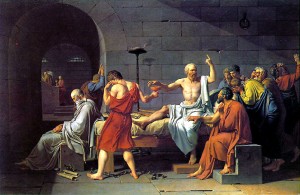
The very first CAS workshop.
As the quarter gets underway, you’ll notice a ton of emails in your inbox from the various CAS workshops on campus. You may have heard a bit about these interdisciplinary working groups from preceptors and professors so far, but to recap briefly, workshops are seminar-style meetings of informal research groups sponsored by the Council on Advanced Studies. These meetings (which are usually once every two weeks) offer a venue for professors and graduate students to convene in an informal setting where they share, discuss, and critique each other’s work. (Also, there is usually nice cheese involved…)
Right now, there are over 70 different workshops ranging from Poetry and Poetics to Mass Culture to Gender and Sexuality (see the full list here). I guarantee you will find at least one—and probably several—that pique your interest. And when you do, go to their webpage and sign up for the listserv. Then you’ll get updates on when/where they are and what to read in advance. Signing up does not commit you to going all (or any) of the workshop sessions—you can attend as many or as few as your schedule allows.
Last year, I joined the Theater and Performance Studies Workshop early in fall, and it became one of the best parts of my MAPH year. The workshops are a big part of graduate student life on campus, and if you like to learn more about them, GSA will be hosting a Master’s Monday “Introduction to CAS Workshops” on October 13th at 9:30 am. I am a firm believer that there are some very concrete benefits to getting involved with a workshop during this year. For instance…
Honing your discussion skills
If you’re in any seminars this fall, workshops are a great chance to practice the fine art of speaking in class. Last fall, I would get inordinately nervous about making comments in class, and the TAPS workshop was a great chance to test the waters of seminar discussion without feeling like there was a grade at stake. You’ll also have more exposure to how professors and grad students talk to one another, which is generally helpful for learning the ropes of academic discourse.
Pro tip: if you’re nervous about speaking up in a workshop, just show up with one good question about the paper. Presenters usually appreciate a thoughtful question about all else.
Seeing professional academia up close
In workshops, you’ll read and comment on drafts of work from PhD candidates, post docs, and professors alike. These can be anything from potential conference papers to dissertation proposals to book chapters.
I remember feeling amazed that my genius professors and advanced PhDs wrote drafts of things—drafts that, lo and behold, were sometimes not perfect. Workshops are a venue where real academic work happens. People bring work that is still very much in progress, and it’s fascinating (and useful) to see that being a professional academic is really about the process of writing. Going to workshop will not only make you sharper at reading and revising your own work—it will be a comfort when you realize that even tenured professors sometimes struggle to put their ideas on paper.
Developing interdisciplinary interests
Bummed that there isn’t an MA program specifically for Animal Studies? One of the purposes of the workshop system is to create homes for genuinely interdisciplinary research. The point of workshops is that they aren’t attached to departments—one of the reasons their discussions are so good is because they bring together scholars from across disciplines. Last year in TAPS, we had regular attendees from English, German, Slavic, EALC, Comp Lit, Music, CMS, and more.
The common thread was that we were all interested in looking at performances as objects of study. The workshop also introduced me to certain performance studies methodologies and disciplinary conventions that became really important as I was working on my thesis. Workshops are a great way to delve deeper into your specific interests and get a sense of how scholars in those fields do their work.
Joining a community of scholars
Simply put, one of the best aspects of life as a MAPH student is access to the brilliant, generous, insightful group of people known as the “UChicago faculty.” Workshops are one of the best ways to access them. Every workshop has 2-3 faculty sponsors who attend every session, and other faculty frequently come to present or comment on work. As such, workshops are a great opportunity to develop relationships with professors in your field.
Beyond that, get to know the other grad students in your workshops! I met a ton of non-MAPH grad students through TAPS, all of whom were lovely people who helped me navigate my year at UChicago. Because they draw students from across departments and divisions, workshops are a great way to branch out and meet grad students beyond the MAPH lounge.
***

The best part of workshops.
As we get in to the quarter, your time will become a scarce (and thus, valuable) resource. But it’s definitely worth carving out ninety minutes every other week to go check out Lit & Phil or see who’s presenting at Post-1945. Workshops are an invaluable part of your MAPH year. They will make you a better, shaper student in class, at office hours, and while writing and editing your thesis. They will introduce you to current academic conversations and help you find your intellectual identity. And—perhaps most importantly—they will give you lots of brie, free of charge.
